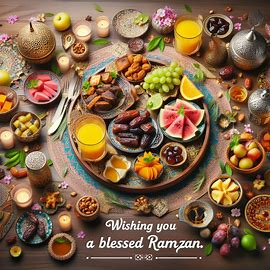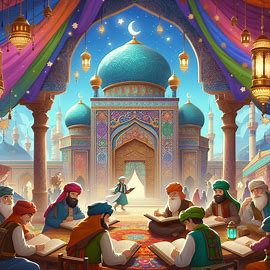Ramadan 101: 44 Focused FAQs for Muslims and Non-Muslims Alike
Introduction to Ramzan
In this blog post Ramadan 101: 44 Focused FAQs for Muslims and Non-Muslims Alike, we’ll answer questions about Ramadan, covering topics such as fasting, prayer, charity, and more. Ramadan, the ninth month of the Islamic calendar, is a time of spiritual reflection, fasting, and charity for Muslims around the world. As the holy month approaches, many Muslims have questions about the rules and regulations of fasting, the significance of Ramadan, and how to make the most of this blessed time. Whether you’re a Muslim looking to deepen your understanding of Ramadan or simply interested in learning more about this important Islamic holiday, this post is for you.
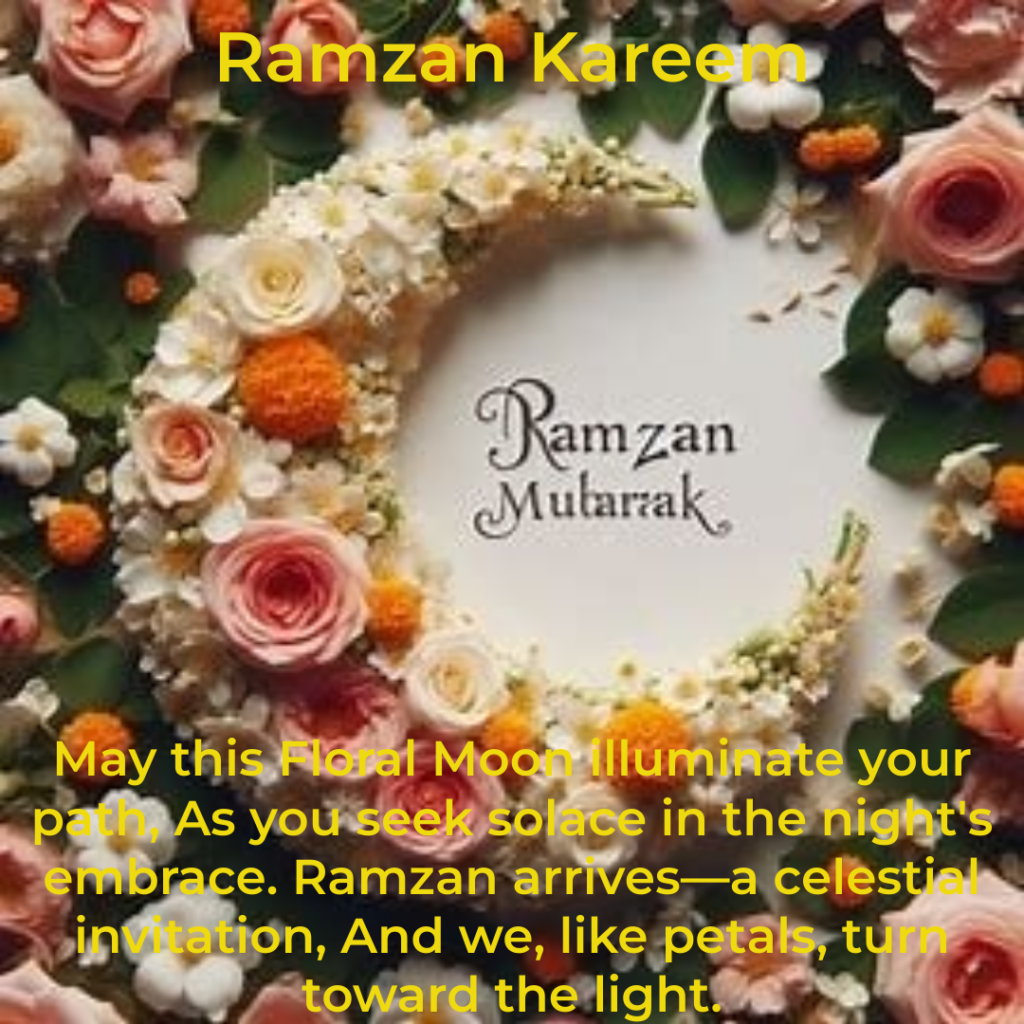
Ramadan[b] (Arabic: رَمَضَان, romanized: Ramaḍān [ra.ma.dˤaːn];[c] also spelled Ramazan, Ramzan, Ramadhan, or Ramathan) is observed by Muslims worldwide as a month of fasting (sawm), prayer (salah), reflection, and community.[9] Occurring during the ninth month of the Islamic calendar,[10] it is a commemoration of Muhammad’s first revelation,[11] the annual observance of Ramadan is regarded as one of the Five Pillars of Islam[12] and lasts twenty-nine to thirty days, from one sighting of the crescent moon to the next.[13][14]
Fasting from dawn to sunset is obligatory (fard) for all adult Muslims who are not acutely or chronically ill, travelling, elderly, breastfeeding, diabetic, pregnant, or menstruating.[15] The predawn meal is referred to as suhur, and the nightly feast that breaks the fast is called iftar.[16][17] Although rulings (fatawa) have been issued declaring that Muslims who live in regions with a midnight sun or polar night should follow the timetable of Mecca,[18] it is common practice to follow the timetable of the closest country in which night can be distinguished from day.[19][20][21]
Ramadan 101: 44 Focused FAQs for Muslims and Non-Muslims Alike
Q 1. What Exactly Is Ramadan?
Ramadan is the ninth month of the Islamic lunar calendar and is considered the holiest time of the year for Muslims. It commemorates the revelation of the Quran to the Prophet Muhammad رسول اللہ صلی اللہ علیہ وسلم (PBUH). During this month, Muslims fast (sawm) from dawn to sunset, and engage in prayer, reflection, and acts of charity.
The lunar calendar means Ramadan shifts earlier by 10–12 days each year. For example, in 2024, it will likely begin around March 10–11, depending on the moon sighting.
Q 2. Why Do Muslims Fast During Ramadan?
Fasting is one of the Five Pillars of Islam, essential to Muslim faith and practice. Beyond abstaining from food and drink, fasting teaches self-discipline, empathy for the less fortunate, and spiritual growth. It’s a time to reset habits, strengthen community bonds, and focus on gratitude.
The Quran states:
“O you who believe, fasting is prescribed for you as it was prescribed for those before you, so that you may attain piety.” (Quran 2:183)
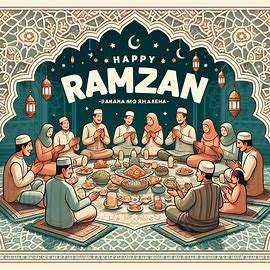
Ramadan begins on a different day each year because the Islamic calendar is a lunar calendar based on the moon’s cycles. The Islamic calendar is about 11 days shorter than the solar calendar, so Ramadan appears to move forward by about 11 days each year (Reference: Islamic Calendar, Muslim World League).
The philosophy behind Ramadan fasting is to develop self-control, empathy for those in need, and a stronger connection with Allah. Fasting is a way to detach from worldly desires and focus on spiritual growth and development (Reference: Quran, 2:183-187).
Ramadan is special because it is the month in which the Quran is revealed to the Prophet Muhammad رسول اللہ صلی اللہ علیہ وسلم (peace be upon him). Fasting during Ramadan is obligatory for Muslims because it commemorates this event and helps them develop self-discipline and spiritual growth (Reference: Quran, 2:185).
The fast during Ramadan became obligatory for Muslims in the second year of the Islamic calendar when the Prophet Muhammad رسول اللہ صلی اللہ علیہ وسلم (peace be upon him) received a revelation from Allah commanding Muslims to fast during this month (Reference: Quran, 2:183-187).
Q 7. Who Has to Fast? Are There Exceptions?
Fasting is obligatory for all physically and mentally capable Muslims who’ve reached puberty. However, Islam prioritizes health and practicality. Exceptions include:
– Children (not required until puberty).
– The elderly or chronically ill.
– Pregnant/breastfeeding women.
– Travelers.
– Those menstruating or experiencing postnatal bleeding.
Individuals who miss fasts due to temporary reasons (e.g., illness) must make up the days later. If unable to fast permanently, they can provide meals to the needy (fidya) instead.
Q 8. What Do Typical Ramadan Days Look Like?
A day in Ramadan revolves around two key meals and spiritual practices:
– Suhoor: A pre-dawn meal to fuel the day. Think hearty oats, dates, eggs, and plenty of water!
– Fasting: No food, drink, smoking, or intimate relations from dawn (Fajr prayer) to sunset (Maghrib prayer).
– Iftar: The meal to break the fast, often starting with dates and water, followed by dishes like soup, grilled meats, and sweets.
–Prayers: Extra nightly prayers (Taraweeh) are held at mosques, where the Quran is recited in full by month’s end.
Q 9. What Happens If You Accidentally Eat or Drink?
Breaking the fast unintentionally (e.g., forgetting you’re fasting) is forgiven in Islam. Simply stop once you realize it and continue the fast. Deliberately breaking a fast without a valid reason requires making up the day(s) later.
Q 10. How Do Muslims Celebrate the End of Ramadan?

Ramadan concludes with Eid al-Fitr, a festive holiday marked by:
– A special morning prayer.
– Wearing new clothes.
– Giving charity (Zakat al-Fitr) to ensure even the poor can celebrate.
– Feasting with family and friends (think biryani, sweets, and gifts!).
Q 11. How Can Non-Muslims Support Friends During Ramadan?
– Be mindful: Avoid scheduling lunch meetings or offering food/drink to fasting colleagues.
– Learn greetings: Say “Ramadan Mubarak” (Blessed Ramadan) or “Ramadan Kareem” (Generous Ramadan).
– Join an iftar: Many communities host public iftars—ask your local mosque!
Muslims believe that they gain several benefits from fasting, including spiritual growth, self-discipline, and a stronger connection with Allah. Fasting is also believed to promote empathy for those in need and to encourage acts of charity and kindness (Reference: Quran, 2:183-187).
The Quran is significant during Ramadan because it is the month in which the Quran was revealed to the Prophet Muhammad رسول اللہ صلی اللہ علیہ وسلم. Muslims are encouraged to read and recite the Quran during Ramadan, and many Muslims try to complete the entire Quran during this month (Reference: Quran, 2:185).
No, Ramadan is observed by all Muslims, including Sunni and Shia Muslims. While there may be some differences in the way that Ramadan is observed by different Muslim communities, the basic principles and practices of Ramadan are the same for all Muslims (Reference: Islamic Calendar, Muslim World League).
Yes, Muslims are expected to continue performing their normal duties and responsibilities during Ramadan, including work, school, and family obligations. However, Muslims are encouraged to prioritize their spiritual activities and to take breaks to rest and recharge during the day (Reference: Quran, 2:183-187).
Q 16. Does fasting during Ramadan have physical benefits?
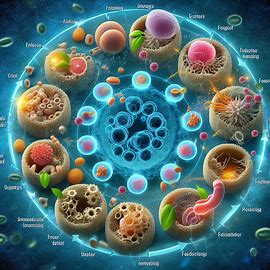
Yes, fasting during Ramadan can have several physical benefits, including weight loss, improved blood sugar control, and reduced inflammation. However, it’s essential to note that fasting is not suitable for everyone, particularly those with certain medical conditions, and Muslims are encouraged to consult with their doctor before fasting (Reference: Healthline, “Ramadan Fasting: Benefits and Risks”).
Fasting during Ramadan involves abstaining from food and drink from dawn to sunset. Muslims are expected to wake up before dawn to eat a meal called suhoor, and then to fast until sunset, when they can break their fast with a meal called iftar (Reference: Quran, 2:183-187).
The start date of Ramadan is determined by the sighting of the new moon, which is typically done by Islamic authorities. The exact start date of Ramadan can vary depending on the location and the method of moon sighting used (Reference: Islamic Calendar, Muslim World League).
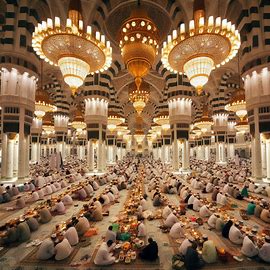
Q 19. The purpose and benefits of Ramadan?
The purpose of Ramadan is to develop self-discipline, empathy for those in need, and a stronger connection with Allah. The benefits of Ramadan include spiritual growth, self-improvement, and a sense of community and belonging among Muslims (Reference: Quran, 2:183-187).
The reason for fasting during Ramadan is to commemorate the revelation of the Quran to the Prophet Muhammad رسول اللہ صلی اللہ علیہ وسلم and to develop self-discipline and spiritual growth (Reference: Quran, 2:185).
Q 21. Why do we give Zakat and Sadaqah in Ramadan?

Zakat and sadaqah are given in Ramadan as a way to purify one’s wealth and to help those in need. Ramadan is considered a blessed month, and many Muslims try to give more charity during this time (Reference: Quran, 2:177).
Yes, it is permissible to feed non-Muslims when offering fidyah for not fasting. Fidyah is a form of charity that is given to compensate for not fasting, and it can be given to anyone in need, regardless of their religion (Reference: Islamic Finance, “Fidyah”).
The first ten days of Ramadan are considered a time of mercy and forgiveness. Muslims are encouraged to increase their acts of worship and charity during this time and to seek forgiveness for their sins (Reference: Quran, 2:183-187).

Q 24. What is sahur and Iftar?
Sahur is the meal that Muslims eat before dawn, before starting their fast. Iftar is the meal that Muslims eat after sunset, to break their fast. Both Sahur and Iftar are important meals during Ramadan and are often eaten with family and friends (Reference: Quran, 2:183-187).
Yes, it is permissible to pray behind an Imam who normally prays a different way. The most important thing is to follow the Imam’s lead and to perform the prayer with sincerity and respect (Reference: Islamic Finance, “Prayer”).
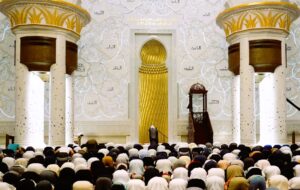
Tarawih is a special prayer that is performed during Ramadan, after the Isha prayer. It is a voluntary prayer, but it is highly recommended, and many Muslims perform it during Ramadan (Reference: Quran, 2:183-187).
The number of units of Taraweeh prayer can vary depending on the mosque and the Imam. Some mosques may perform 8 units, while others may perform 20 units. The most important thing is to follow the Imam’s lead and to perform the prayer with sincerity and respect (Reference: Islamic Finance, “Taraweeh”).
It is not recommended to hold a copy of the Qur’an or an electronic device during Taraweeh’s prayer. Instead, Muslims are encouraged to focus on the prayer and to follow the Imam’s lead (Reference: Islamic Finance, “Taraweeh”).
If you broke your fast in Ramadan, you should make up the missed day as soon as possible. You can also ask Allah for forgiveness, but making up the missed day is an important part of maintaining the integrity of the fast (Reference: Quran, 2:183-187).
It is generally recommended to avoid using medications or other substances that may break the fast unless they are necessary. If you have a medical condition, you should consult with your doctor before fasting (Reference: Healthline, “Ramadan Fasting: Benefits and Risks”).
It is not recommended to go swimming while fasting, as it may cause you to swallow water, which would break the fast. However, if you need to swim for medical or other reasons, you should consult with your doctor before doing so (Reference: Islamic Finance, “Fasting”).
It is generally recommended to avoid using eye/ear/nose drops or enemas while fasting unless they are necessary. If you have a medical condition, you should consult with your doctor before fasting (Reference: Healthline, “Ramadan Fasting: Benefits and Risks”).
It is generally recommended to avoid going to the dentist while fasting unless it is an emergency. If you need to go to the dentist, you should consult with your doctor before doing so (Reference: Healthline, “Ramadan Fasting: Benefits and Risks”).
A medical injection may break the fast, depending on the type of injection and the circumstances. If you have a medical condition, you should consult with your doctor before fasting (Reference: Islamic Finance, “Fasting”).
Vomiting may break the fast, depending on the circumstances. If you vomit unintentionally, you do not need to make up the day. However, if you vomit intentionally, you should make up the day as soon as possible (Reference: Quran, 2:183-187).
It is generally recommended to avoid giving blood while fasting, as it may cause dehydration and other health problems. However, if you need to give blood for medical reasons, you should consult with your doctor before doing so (Reference: Healthline, “Ramadan Fasting: Benefits and Risks”).
There are several disliked matters during fasting, including eating or drinking intentionally, engaging in sexual activity, and using perfumes or fragrances. Factors that nullify the fast include eating or drinking intentionally, vomiting intentionally, and engaging in sexual activity (Reference: Islamic Finance, “Fasting”).
It is permissible for you not to fast if your circumstances make it difficult or impossible to do so. However, you should make up the missed days as soon as possible, and you should also consider alternative forms of worship, such as prayer and charity (Reference: Quran, 2:183-187).
No, making up missed fasts does not have to be done consecutively. You can make up the missed days at any time, as long as you do so before the next Ramadan (Reference: Islamic Finance, “Fasting”).
The reward for making up fasts that were missed during the postpartum period and for other excuses is not the same as the reward for fasting in Ramadan. However, making up missed fasts is still a highly rewarding act of worship, and it is encouraged for Muslims to do so as soon as possible (Reference: Quran, 2:183-187).
Fasting for Muslims is a unique and distinctive form of worship that is based on the Quran and the Hadith. While other religions may also practice fasting, the rules and regulations surrounding fasting in Islam are specific and distinct (Reference: Islamic Finance, “Fasting”).
Q 42. What is the Night of Power in Ramadan?
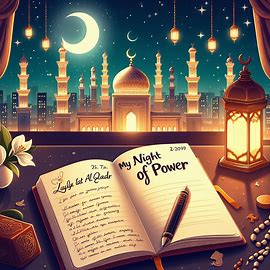
The Night of Power, also known as Laylat al-Qadr, is a special night in Ramadan that is considered to be the most blessed and rewarding night of the year. It is believed to be the night when the Quran was revealed to the Prophet Muhammad رسول اللہ صلی اللہ علیہ وسلم, and it is a time of great spiritual significance and celebration (Reference: Quran, 97:1-5).
Zakat al-Fitr is a form of charity that is given during Ramadan, typically at the end of the month. It is a small amount of money that is given to the poor and needy, and it is considered to be a highly rewarding act of worship (Reference: Quran, 2:177).
Q 44. Why do dates matter in Ramadan?

A: Dates are nutrient-rich and were a favourite of the Prophet Muhammad (PBUH), making them a symbolic way to break the fast.
Ramadan is a deeply spiritual time of reflection, community, and renewal. Whether you’re observing it for the first time or simply learning, understanding its purpose fosters respect and connection.
